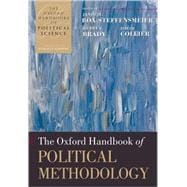
The Oxford Handbook of Political Methodology
by Box-Steffensmeier, Janet M.; Brady, Henry E.; Collier, David-

This Item Qualifies for Free Shipping!*
*Excludes marketplace orders.
Buy New
Rent Textbook
Rent Digital
Used Textbook
We're Sorry
Sold Out
How Marketplace Works:
- This item is offered by an independent seller and not shipped from our warehouse
- Item details like edition and cover design may differ from our description; see seller's comments before ordering.
- Sellers much confirm and ship within two business days; otherwise, the order will be cancelled and refunded.
- Marketplace purchases cannot be returned to eCampus.com. Contact the seller directly for inquiries; if no response within two days, contact customer service.
- Additional shipping costs apply to Marketplace purchases. Review shipping costs at checkout.
Summary
Author Biography
Janet Box-Steffensmeier is the Vernal Riffe Professor of Political Science, Director of the Program in Statistics and Methodology, and courtesy faculty of Sociology at the Ohio State University. She holds a B.A. in mathematics and political science from Coe College (1988), and a Ph.D. in political science from the University of Texas at Austin (1993).
Henry Brady is Professor of Political Science and Public Policy at UC Berkeley. He received his Ph.D. in Economics and Political Science from MIT in 1980. His areas of interest include Quantitative Methodology, American and Canadian Politics, and Political Behavior. He teaches undergraduate courses on political participation and party systems and graduate courses on advanced quantitative methodology.
David Collier is Professor of Political Science at UC Berkeley. His fields are comparative politics, Latin American politics, and methodology. His latest book is Rethinking Social Inquiry: Diverse Tools, Shared Standards (Rowman & Littlefield, 2004), of which he is co-editor and co-author with his Berkeley colleague Henry E. Brady.
Table of Contents
| Introduction | |
| Political Science Methodology as a Disciplinary Crossroads: An Overview of Diverse Influence | p. 1 |
| Building Blocks of Social Science Methodology | p. 1 |
| Intentionality, Rationality and Individual Action: Alternative Views | |
| Interpretive Perspectives: Meaning, Action and Intersubjectivity | |
| New Economic Perspectives: Beliefs, Signaling, Updating and Expectations | |
| Concepts and Measurement | |
| Theoretical Approaches to Concepts | p. 1 |
| The Evolving Influence of Psychometrics and Measurement Theory | p. 1 |
| Measurement in Qualitative Research and Exemplars of Concept Formation. and Measurement | p. 1 |
| General Lessons on Measurement | |
| Causality and Explanation in Social Research | |
| What is Causality? | |
| Statistical Framework for Inferring Causality | |
| Causal Inference in Quantitative and Qualitative Research | |
| Quantitative Tools for Causal Inference | |
| History of Quantitative Methodology | |
| Bayesian Analysis | |
| Time-Series Cross-Sectional Data Technique | |
| Spatial Analysis | |
| Hierarchical Modeling | |
| Discrete Choice Modeling18. Wendy K. Cho, Charles Manski: Ecological Inference | |
| Survey Methodology | |
| Survival Analysis | |
| Time Series Analysis | |
| Potentials and Limits of Political Methodology in Macrocomparative Research Designs | |
| Qualitative Tools for Causal Inference | |
| Case Studies, Process Tracing and Structured focused Comparison | |
| Comparative Historical Methods | |
| Fuzzy Set Analysis: Calibration versus Measurement | |
| Case-Orientated Configurational Research Using QCA | |
| Interviewing, Ethnography and Qualitative Field Methods | |
| Integrating Measurement and Causal Inference | |
| Methodology and Micro Foundations | |
| Studying Mechanisms: Strengthening Casual Inference in Quantitative Research | |
| Agent-Based Modeling | |
| Experiments, Quasi-Experiments and Natural Experiments | |
| Experimentation in Political Science | |
| Quasi-Experiments, Natural Experiments and Evaluation Research | |
| Organizations and Institutions in the Field of Methodology | |
| ICPSR, CQRM and APSA Political Methodology and Qualitative Methods Section | |
| Forty Years of Publishing in Political Methodology: Sage Publications, Specialized Journals, Newsletters and Access to Mainstream Journals | |
| Political Methodology: Old and New | |
| Making the Most of Complimentarily: Qualitative and Quantitative Methods | |
| Intersections in the Trajectories of Qualitative and Qualitative Methods | |
| Table of Contents provided by Publisher. All Rights Reserved. |
An electronic version of this book is available through VitalSource.
This book is viewable on PC, Mac, iPhone, iPad, iPod Touch, and most smartphones.
By purchasing, you will be able to view this book online, as well as download it, for the chosen number of days.
Digital License
You are licensing a digital product for a set duration. Durations are set forth in the product description, with "Lifetime" typically meaning five (5) years of online access and permanent download to a supported device. All licenses are non-transferable.
More details can be found here.
A downloadable version of this book is available through the eCampus Reader or compatible Adobe readers.
Applications are available on iOS, Android, PC, Mac, and Windows Mobile platforms.
Please view the compatibility matrix prior to purchase.